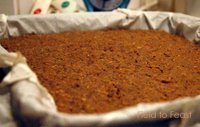 I was born in
I was born in
Why a rusk, of course. Rusks are hard, dry biscuits – perfect for dipping in tea or coffee. This twice-baked breakfast staple is one food expatriate South Africans long for, and insist that visitors bring them. Tradition says rusks were invented by early travelers and explorers who needed foods that wouldn’t spoil.
In the rusk recipe below, the active steps are interspersed with periods of waiting while the dish bakes or cools. That means you’ll want to prepare rusks when you’ve already planned on spending a couple hours in the kitchen, or on a lazy weekend afternoon when you need to get up periodically to refill your lemonade anyway. As the title of this post suggests, the final product will not be ready until the following morning, after a night of drying in a barely-warm oven. Also, note that the original recipe uses milliliters and grams. I’ve converted the milliliters, but it’s best to use a kitchen scale to measure out the grams. Or, for approximate gram conversions, you can use this site as a resource.
Four-Seed Whole-Wheat Rusks
Adapted from Food and Home Entertaining, July 2002
Makes 48
500 grams whole-wheat flour
140 grams cake flour
5 milliliters / 1 teaspoon salt
30 milliliters / 2 tablespoons baking powder
200 grams treacle sugar (you can substitute molasses, or light or dark corn syrup)
250 grams butter, at room temperature
50 grams desiccated coconut
80 grams oats
80 grams sunflower seeds
30 grams poppy seeds
30 grams linseeds (a.k.a. flaxseeds)
50 grams sesame seeds
500 milliliters / 2 cups buttermilk
250 milliliters / 1 cup water
2 jumbo eggs, lightly beaten
Line a 39 x 32 x 4 centimeter (approx. 15 x 19 x 2 inch) baking tray with baking paper, and pre-heat your oven to 180 degrees Celsius (360 degrees Fahrenheit).
In a large bowl, sift together the whole-wheat flour, cake flour, salt and baking powder. If some bran husks remain in the bottom of your sifter, return them to the bowl. Add the treacle sugar, and stir. Dice the butter over the flour mixture and rub it in with your fingers. Then add the coconut, oats and all of the seeds, and mix well.
In a medium bowl, combine the buttermilk, water and eggs. Beat lightly with a fork, and add to the batter. Using a large metal spoon, gently fold in the liquid.
Spoon the dough into the prepared baking tray and cover with aluminum foil. Bake for 30 minutes at 180 degrees (360 F). Then, remove the foil and reduce the temperature to 160 degrees (320 F). Bake until a toothpick inserted in the middle comes out clean, about 30-40 minutes.
 Remove the tray from the oven and cool completely. This step requires substantial willpower because what you have in front of you looks and tastes like a bran muffin cake. Write “bran muffins” down on your list of things to bake next weekend, and leave the poor rusks-to-be alone.
Remove the tray from the oven and cool completely. This step requires substantial willpower because what you have in front of you looks and tastes like a bran muffin cake. Write “bran muffins” down on your list of things to bake next weekend, and leave the poor rusks-to-be alone.
The next step is to cut the tempting muffin cake into 8 x 3 centimeter (approx. 3 x 1 inch) rectangles. You can do this while it is still in the tray, or you can turn the cake out onto a solid surface. Arrange the rectangles on oven racks, spaced slightly apart so that the dry, barely-warm air can circulate. Dry overnight for 12 hours at 50-60 degrees (130-140 F), keeping the oven door closed.
Open the door in the morning, and admire your rusks for a moment. They should be very dry and dense. Serve with your wake-up tea or coffee. Cool and store the remaining rusks in an airtight container. They will keep for weeks.
What a better way to start your day?






No comments:
Post a Comment